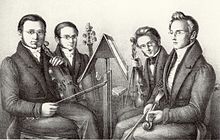Müller brothers
The Müller brothers were two famous 19th century string quartets .
The first quartet
The first quartet consisted of the four sons of the Braunschweig chamber musician Aegidius Müller (born July 2, 1766 near Görsbach near Nordhausen , † August 14, 1841 in Braunschweig), who initially trained them. The quartetists worked at the Braunschweig Opera House .
- Karl Friedrich Müller (born November 11, 1797 in Braunschweig; † April 4, 1873 there) played the first violin in the quartet . At the age of 14 he was employed at the royal chapel in Berlin and trained by Carl Moeser , in 1815 a member of the Braunschweig court orchestra and later concert master . As a teacher, he shaped a whole generation of violinists. After 60 years of service, he retired on January 1, 1872.
- Georg Franz Ferdinand Müller (born August 29, 1808 in Braunschweig; † May 22, 1855 there) played the second violin in the quartet. In the band he was employed first as a chamber musician, then as music director and, after a study trip to Paris in 1842, as the successor to Albert Methfessel as Kapellmeister . Under his leadership, the Braunschweig Orchestra developed into one of the first in Germany and enjoyed the recognition of contemporary composers such as Felix Mendelssohn Bartholdy , Friedrich Schneider , Louis Spohr , Conradin Kreutzer and Giacomo Meyerbeer , who performed their works here. Georg also composed several of his own works. Spohr attached significant musical value to his great opera Pino di Porto , but it failed because of the text by Friedrich Konrad Griepenkerl .
- Gustav Heinrich Theodor Müller (born December 13, 1799 in Braunschweig; † September 7, 1855 there) conducted the inter-act music with the title Symphony Director in the chapel and played the viola in the quartet .
- Theodor August Müller (born September 27, 1802 in Braunschweig; † October 20, 1875 there) played the cello and was also a teacher.
The first quartet ended in 1855 with the deaths of Georg and Gustav.
The second quartet
The second quartet was formed by four sons of Karl Friedrich and existed from 1855 to 1873.
- 1st violin: Karl Müller-Berghaus, (* April 14, 1829, Braunschweig; † November 11, 1907, Stuttgart), became Kapellmeister in Rostock in 1867. From then on Leopold Auer took over the leadership of the quartet. Karl later became the conductor of the spa orchestra in Wiesbaden and at times led the private orchestra of the Russian Baron Dervies in Nice. He settled in Stuttgart in 1880, but also worked in Hamburg from 1881–86. Karl composed two string quartets, a symphony, an overture, the opera Die Kalewainen in Pochjola and a number of songs and chamber music. The name "Berghaus" is the maiden name of his wife Elvira, a famous concert singer at the time. - He also worked for the Turku Musical Society in Finland (1886–1895).
- 2nd violin: Hugo Müller (* September 21, 1832, Braunschweig; † June 26, 1886, Braunschweig)
- Viola: Bernhard Müller (* February 24, 1825, Braunschweig; † September 4, 1895, Rostock)
- Violoncello: Wilhelm Müller (born June 1, 1834, Braunschweig; † September 1897, New York). From 1869 he also played in the Joachim Quartet; In 1873 he became the first cellist of the royal chapel in Berlin and professor at the Berlin University of Music.
Criticism and importance
After a visit to Braunschweig in 1843, the French composer Hector Berlioz said about the quartet and the orchestra: “I must say at this point that, until this day, I have never been in France, Belgium, or anywhere else in Germany had seen outstanding artists gathered who would have been so devoted, attentive and enthusiastic about their task ... ”.
literature
Chronologically
- Louis Köhler: The Müller brothers and the string quartet. Matthes, Leipzig 1858 ( digitized version )
- Louis Köhler: The quartets of the Müller brothers and the Florentines. In: New magazine for music . 63, 1867, no. 23 pp. 201–202 ( Textarchiv - Internet Archive ) and no. 24 pp. 209–210 ( Textarchiv - Internet Archive ).
- Bernhard Müller: Müller . In: Allgemeine Deutsche Biographie (ADB). Volume 22, Duncker & Humblot, Leipzig 1885, pp. 499-501.
- Ernst Stier: The Müller Brothers String Quartet. In: Braunschweigisches Magazin. Volume 19, 1913, pp. 73 ff.
- Willi Kahl: In memory of the older string quartet of the Müller brothers. In: New magazine for music. Vol. 96, 1929, pp. 85-86 ( Textarchiv - Internet Archive ).
- Steffen Tiggeler : Müller , Müller-Berghaus, Karl and Müller, Wilhelm. In: Horst-Rüdiger Jarck , Günter Scheel (ed.): Braunschweigisches Biographisches Lexikon - 19th and 20th centuries . Hahnsche Buchhandlung, Hannover 1996, ISBN 3-7752-5838-8 , p. 427-428 .
proof
- ↑ Riemann Music Lexicon . 10th ed. 1922, p. 862. ( Textarchiv - Internet Archive ).
- ↑ Varhainen Kalevala-ooppera esitetään Turussa vuoden kuluttua. In: Helsingin Sanomat . March 2, 2016.

